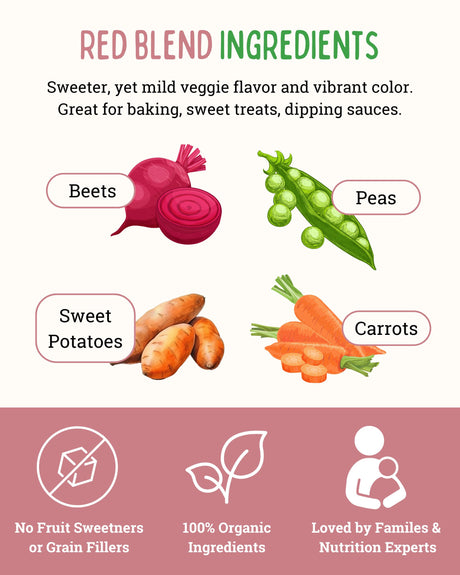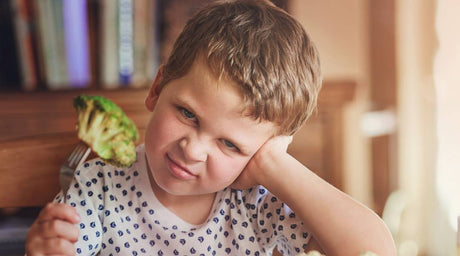Navigating the Overlap: Allergies vs. Colds in Kids
It's a scene many parents are all too familiar with: your child wakes up with a runny nose, sneezing, and watery eyes. The immediate thought? Is it a cold or allergies?
Especially during certain times of the year, it can be challenging to pinpoint the culprit behind these symptoms. Both colds and allergies can present in similar ways, making it a bit of a guessing game for parents.
Understanding the difference between the two is crucial. Not only does it affect how you'd comfort your little one, but it also impacts the treatments and remedies you might consider.
While some symptoms overlap, colds and allergies have distinct causes and, often, some tell-tale signs. As we dive into this topic, we'll explore the nuances of each, helping parents like you feel more equipped to support your child's health and well-being.
Unraveling the Allergy Mystery: What Parents Need to Know
Defining Allergies in the Little Ones
Allergies are the body's immune system's response to substances that are typically harmless. In children, just like in adults, the immune system mistakenly identifies these substances, known as allergens, as threats.
This results in the release of chemicals like histamine, which cause allergy symptoms. It's a protective response, albeit an overzealous one, to what the body perceives as invaders.
Common Culprits: Kids' Allergens
When we think of allergies, seasonal triggers like pollen often come to mind. However, children can be allergic to a variety of things. Some of the most common allergens for kids include pollen from trees, grasses, and weeds, but there's more.
Dust mites, those tiny creatures that live in our homes, can also be problematic. Then there's pet dander, which can be especially challenging for families with furry or feathered friends.
It's worth noting that children can also be allergic to certain foods, insect stings, and even some medications, though these manifest differently than environmental allergies.
Spotting the Signs: Allergy Symptoms in Children
While some allergy symptoms mirror cold symptoms, there are often a few giveaways. Persistent sneezing, especially when outdoors, can be a sign. Itchy, watery eyes are another hallmark of allergies, something not typically seen with colds.
Children with allergies might also complain of an itchy throat or ears. Nasal congestion and a runny nose with clear mucus can also indicate allergies.
And let's not forget about those dark circles under the eyes, often referred to as "allergic shiners," which result from nasal congestion. Recognizing these symptoms can be the first step in getting your child the relief they need.

Decoding the Common Cold: A Parent's Guide
The Culprit Behind Colds: Viruses at Play
Unlike allergies, which are caused by the body's response to allergens, colds are the result of an infection with a virus. The common cold is aptly named, as it's one of the most frequent illnesses children encounter.
There are over 200 different viruses that can cause cold symptoms, with rhinoviruses being the most common culprits. These viruses are highly contagious and can spread through droplets from a person with a cold when they cough, sneeze, or even talk.
It's no wonder that the common cold is, well, so common, especially among kids who are still learning about personal space and hygiene.
Recognizing a Cold: Typical Symptoms in Little Ones
While there's some overlap with allergy symptoms, colds often have a few distinguishing signs. For starters, colds often come on gradually. Your child might start with a sore throat, then progress to a runny or stuffy nose.
Unlike the clear mucus often seen with allergies, nasal discharge during a cold can be thicker and might turn yellow or green. Children with colds might also experience fatigue, a low-grade fever, and a cough.

Allergies vs. Colds: Deciphering the Symptoms
Duration: The Long and Short of It
One of the most telling differences between allergies and colds is how long symptoms persist. Allergies can last for weeks or even months, especially if the child continues to be exposed to the allergen. Think of the child who sneezes through the entire pollen season.
On the other hand, colds have a more defined timeline. They usually come on gradually and typically resolve within 7-10 days. If your child's symptoms are lingering for more than two weeks, it might be time to consider allergies.
Nasal Discharge: Clear Signals
The nature of a child's nasal discharge can offer clues. Allergies often produce a clear, watery nasal discharge, thanks to the body's release of histamine. Colds, however, can start with clear mucus that becomes thicker and can turn yellow or green as the body fights off the virus. While this can be concerning to see, it's a natural part of the body's healing process.
Fever: The Heat is On (Or Not)
Fever is another distinguishing factor. Allergies, despite their sometimes severe symptoms, don't cause fever. However, it's not uncommon for a child with a cold to have a low-grade fever as the body tries to fend off the viral invader.

Seasonal Symptoms: Timing is Everything
While colds can strike any time of the year, they're most common in the winter. Allergies, on the other hand, often have a seasonal pattern. If your child consistently gets "sick" at the same time every year, it might be allergies at play. For instance, tree pollen allergies typically flare in the spring, while grass pollen can be a summer trigger.
Eyes: The Windows to Allergies
Itchy, watery eyes are a hallmark of allergies. This symptom is less common with colds. If your child is constantly rubbing their eyes and you notice they're red and irritated, allergies might be the culprit.
Aching Muscles: The Weight of Colds
While allergies can make a child feel tired and rundown, they don't typically cause the body aches associated with colds. If your child is complaining of sore muscles or seems more fatigued than usual, it might be a sign they're fighting off a cold virus.
In the maze of sniffles, sneezes, and coughs, understanding these differences can help guide the way to appropriate care and relief for your little one.
Navigating Allergy Relief: Remedies and Care
Avoiding Allergens: Prevention is Key
Before diving into treatments, it's essential to understand the power of prevention. If you're aware of what triggers your child's allergies, do your best to minimize their exposure. This might mean keeping windows closed during high pollen counts, ensuring your home is dust-free, or being cautious around pets. Remember, avoiding allergens can significantly reduce the severity and frequency of allergy symptoms.
Over-the-Counter Antihistamines: A First Line of Defense
For many kids, over-the-counter antihistamines can be a game-changer. These medications work by blocking histamine, a chemical released by the body during an allergic reaction. Brands like Claritin, Zyrtec, and Benadryl have children's formulations, but always consult with a pediatrician before giving any medication.
Nasal Saline Rinses: Clearing the Path
Nasal congestion is a common allergy symptom, and saline rinses can offer relief. These rinses help clear out allergens and mucus from the nasal passages. For children, using a saline spray might be more manageable than a full rinse. It's a natural way to alleviate congestion and can be used in conjunction with other treatments.
Allergy Shots or Immunotherapy: A Long-Term Solution
For kids with severe allergies that aren't managed with the above remedies, allergy shots, or immunotherapy, might be an option. This treatment involves giving small doses of allergens to the child over time, with the aim of desensitizing their immune system. It's a more extended commitment, often spanning several years, but can significantly reduce or even eliminate allergy symptoms for some.
In the world of allergies, understanding and finding the right remedy for your child can make all the difference. With a combination of avoidance strategies and treatments, it's entirely possible to manage and alleviate those pesky allergy symptoms.
Tackling the Common Cold: Remedies and Care
Rest and Hydration: The Dynamic Duo
When it comes to colds, never underestimate the power of good old-fashioned rest. Our bodies repair and heal during sleep, making it crucial for kids feeling under the weather. Alongside rest, hydration plays a pivotal role. Ensure your child drinks plenty of water, as staying hydrated helps thin mucus and keeps the throat moist, alleviating some of the discomfort.

Over-the-Counter Cold Remedies: Choose Wisely
The pharmacy shelves are lined with a myriad of cold remedies, but not all are suitable for kids. When selecting an over-the-counter solution, always opt for those specifically formulated for children. Ingredients and dosages differ, so always read labels carefully and consult with a pharmacist or pediatrician if in doubt.
Warm Fluids and Humidifiers: Comfort in Warmth
Warm fluids, like herbal teas or warm broth, can be soothing for a sore throat and can also help reduce congestion. For nighttime relief, consider using a humidifier in your child's room. The added moisture in the air can help relieve dry throats and nasal passages, making for a more comfortable night's sleep.
When to See a Doctor: Trusting Your Instincts
While most colds resolve on their own, it's essential to recognize when professional medical advice is needed. If your child has a high fever, symptoms lasting more than ten days, difficulty breathing, or any other severe symptoms, it's time to consult a doctor. Always trust your parental instincts; you know your child best.
In the midst of cold season, being equipped with knowledge and practical remedies can make all the difference. Remember, while colds are common, ensuring your child receives the right care and attention will have them back to their playful selves in no time.
Prevention is Better Than Cure: Tips and Tricks
Reducing Allergen Exposure: Create a Safe Haven
Allergens are everywhere, but with a few tweaks, you can make your home a safe haven for your little ones. Start by using allergen-proof bed covers to protect against dust mites.
Regularly wash bedding in hot water and consider using a dehumidifier to keep humidity levels below 50%.
For those pesky outdoor allergens like pollen, keep windows closed during high pollen seasons and ensure your child showers after outdoor play. Remember, it's not about creating a bubble but reducing exposure where possible.
Hygiene Practices: The First Line of Defense
We've all heard it before, but hand washing truly is a game-changer. Teach your kids the importance of washing their hands with soap and water, especially after playing outside, before eating, and after using the restroom.

It's a simple yet effective way to ward off cold-causing germs. Additionally, remind them to avoid touching their face, especially their eyes, nose, and mouth, as this can introduce germs into the body.
Balanced Diet for a Robust Immune System: Fueling the Defenses
A strong immune system is a child's best defense against both allergens and colds. And what's the key to a robust immune system? A balanced diet!
Ensure your child's plate is colorful, filled with a variety of fruits, vegetables, whole grains, and lean proteins. Foods rich in vitamin C, like oranges and strawberries, and zinc, found in beans and nuts, are particularly beneficial. Think of food as fuel, equipping your child's body to tackle whatever comes its way.
In the journey of parenting, prevention truly is the best medicine. By taking these proactive steps, you're not only safeguarding your child's health but also teaching them invaluable habits that will serve them well throughout life.
Wrapping It Up: Observations, Consultations, and Interventions
Observing and Understanding: The First Step
Every sniffle, sneeze, or cough can be a cause for concern for parents. But understanding the difference between allergies and colds can empower you to respond effectively. Observing and recognizing the nuances in symptoms is the first step in ensuring your child gets the right care. Remember, knowledge is power, and the more you know, the better equipped you are to support your child's well-being.
Consultation is Key: Trust the Experts
While it's essential to be informed, it's equally crucial to know when to seek expert advice. Pediatricians are trained to differentiate between common ailments and can provide guidance tailored to your child's unique needs. So, when in doubt, always consult with your child's doctor. They're your partner in ensuring your child's health and well-being.
Prevention and Timely Interventions: The Best Approach
Lastly, while we can't shield our kids from every germ or allergen, we can take preventive measures to reduce their risk. From hygiene practices to dietary choices, small daily actions can make a significant difference. And when symptoms do appear, timely interventions can prevent complications and speed up recovery.
Parenting is a journey filled with challenges and rewards. By staying informed, consulting experts, and emphasizing prevention, you're not only ensuring your child's health but also teaching them the importance of self-care and well-being. Here's to healthy, happy kids!
Leave your comments below; we love to hear from you! And don't forget to follow EasyPeasie for more veggie info and convo on YouTube, Facebook, and Instagram! ~ThePeas













